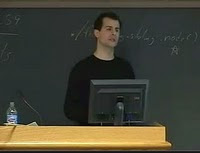
Java Evolution <<
Core Java offers a total immersion approach for C\C++ programmer wanting to learn java.
The course will use JDK(Java Development Kit) and covers all the new language features.
Java History<<
• Java is a general purpose , object-oriented programming language.
• The fastest growing programming language in the history of computing
Java features<<
Java is a simple language as it does not use pointers, preprocessor header files; go to statement and many more others.
Benefits of java over C and C++ <<
Architecturally neutral. Once written, the same Java program can be run on any
platform computer and operating system) that supports Java.
How Java works <<
1. Programmer codes Java source statements
2. Java compiler converts source statements into bytecode (platform-independent object language)
The Java programming language <<
With a compiler, it translates a Java program into an intermediate language called Java bytecodes--the platform-independent codes interpreted by the Java interpreter.
The Java Platform <<The Java API is a large collection of ready-made software components that provide many useful capabilities, such as graphical user interface (GUI) widgets. The Java API (application programming interface) is grouped into libraries (packages).
Java Development Kit*<<
The Java Development Kit comes with a collection of tools that are used for developing and running Java programs.
Hardware & Software requirement <<
Java is currently supported on Window 95, Window NT, Sun Solaries, Macintosh and UNIX machine.
The minimum software and hardware requirement for 95 version of Java
Disadvantage of Java <<
• Not supported by all platforms (though third-party JVM software is usually available)
• Slower in execution than compiled languages
Overview of Java Language <<
Developing the Java Application*<<
Comments in Java Code <<
Defining a class <<
The main method <<
Using classes and objects <<
Java Program Structure <<
Java Tokens <<
Constant, Variable and Datatype <<
Variable <<
Declaring Variable <<
Rule on Variable Names <<
Variable Type <<
Primitive Data Type <<
data type <<
Operator and Expression <<
Expression and operators <<
Operator Precedence <<
Integer Operators <<
Relational Integer Operators <<
Floating point Operators <<
String Operator <<
Assignment Operator <<
Arithmetic assignment Operator <<
Conversions <<
Casts <<
Boolean expression & Operations <<
Logical Operators <<
Bitwise operators <<
The complement operator <<
Decision making, Branching & looping <<
Flow control with if & else <<
The if statement <<
The else statement <<
Switch statement <<
For, while & do-while statement <<
The for statement <<
The while statement <<
The do-while statement <<
Using break and continue <<
The break statement <<
The continue statement <<
Class Object and Method <<
Introduction to class <<
The benefit of classes<<
Defining class<<
Class using constructor <<
Object
Declaring an Object
Instantiating an Object
Initializing an Object
Referencing an object's Variable
Calling an Object method
Creating a class
The class Declaration
The class body
Constructions for class
Implementing Methods
The Method body
Example of Math class
Array and String
Array
Java array
Object array
Strings
String concatenation
Inheritance
Introduction
Creating subclasses
Member variables in subclass inherit
Hiding member Variables
Methods in subclass Inherit
Overriding Method
Methods a subclass cann't override
Methods a subclass must override
The Benefits of Inheritance
Interfaces
Interfaces and Classes
Implementing and using Interface
Implementing Multiple Interfaces
Creating and Extending Interfaces
Methods inside Interfaces
Extending Interfaces
Packagee
Introduction
Declaring Packages
Importing Packages
Creating Our Own Packages
The Java Language Packages
The Java I/O Packages
The Java Utility Packages
The Java Networking Packages
The Jajava.sun.com/j2se/1.4.2/docs/api/java/applet/package-summary.htmlva Applet Packages
The Java abstract Window Toolkit Packages
Multithreading
Introduction
Thread
Thread Attributes
Thread State
Thread Group
Method that Operate on All Thread
Access Restriction Methods
The notify All () and wait () methods
Frequently used Method
Exception Handling
Introduction
What is an Exception
If Exception than?
The exception handling technique
Some terminology
Throw, try, and catch blocks
Multiple catch blocks
The finally clause
The throwable class
Type of exception
Different list of exception
Built-in Exceptions
Applet
Introduction
How Applets and Applications are different
Limitation of Applets
The Applet Class
Major Applets Activities
The life cycle of a Web page Applet
Including am Applet on a Web Page
Essential HTML to launch an Applet & pass it parameters
Launching an Applet in an html/core_java Document
A Sample Applet that receives a Parameter
Posting a Web Page that launches a custom Applet
Managing Input/Output Files in Java
Introduction
Stream
Input Streams
The Abstract Class Input Stream
The File Class
The FileDialog Class
Low-level & High-level Stream Class
The FileOutputStream Class
The FileInputStream Class
The DataOutputStream Class
The DataInputStream Class
The ObjectOutputStream Class
The objectInputStream Class






0 comments:
Post a Comment